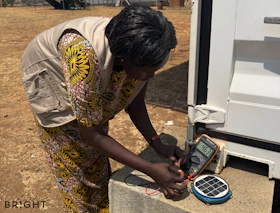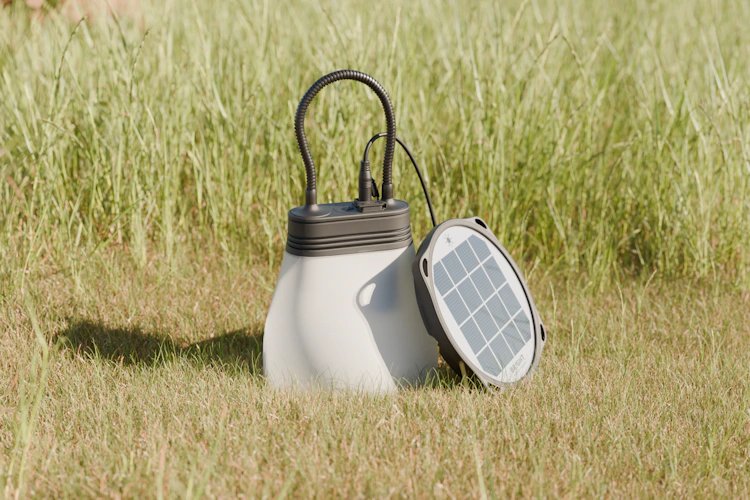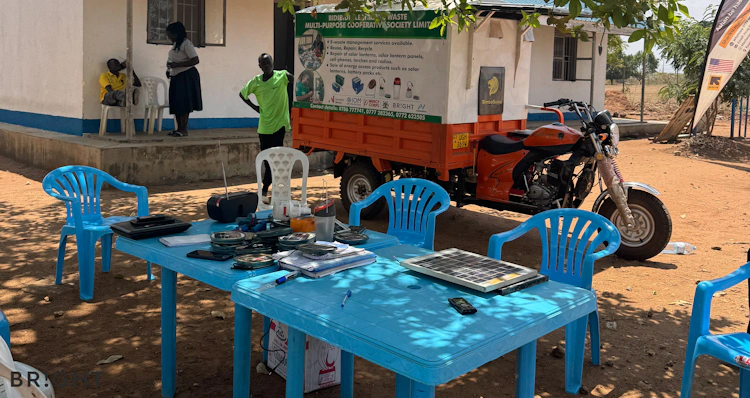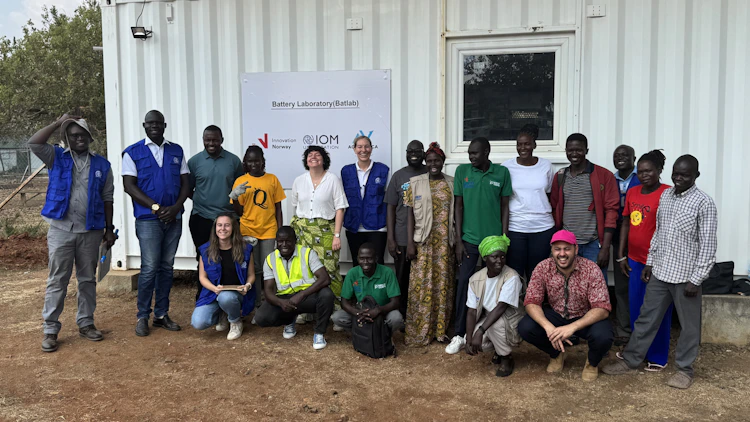
BRIGHT’s solar lamp Repair Program: Partnering on the leading e-waste management project in the humanitarian sector
In Uganda’s Bidibidi refugee settlement, the International Organization for Migration (IOM) is leading several partners in pioneering the most comprehensive electronic waste (e-waste) management project in the humanitarian sector. At the heart of this project is BRIGHT’s solar lamp Repair Program which is training technicians who are turning e-waste into opportunity through the repair and refurbishment of solar lamps. These technicians have since the launch of the E-waste Management project in 2022 repaired 6,361 solar lamps and 341 solar panels, reduced e-waste, and significantly improved their livelihoods. By embracing a circular economy, improving product design, and centering community voices, BRIGHT’s Repair Program offers a sustainable model for handling e-waste in displacement settings, aligning with Sustainable Development Goals 7 (Affordable and Clean Energy) and 12 (Responsible Consumption and Production).
Factbox
-
![]()
BRIGHT ran its Repair Program in Bidibidi as part of an innovative multi-stakeholder E-waste Management project led by IOM and funded by Innovation Norway. Some of the successes of this project since its launch in 2022 include:
• 6,361 solar lamps and 341 solar panels repaired.
• Establishment of the 30-member Bidibidi Electronic Multipurpose Cooperative Society (BEMCOS) comprising refugees and host community members.
• Livelihoods transformed: Technicians report increased income, education investments, and home ownership.
• Community upskilled: Trained eight technicians in electronics repair and digital literacy, fostering demand for advanced training.
• Product design enhanced: Insights informed more durable, repairable solar lamp designs.
• Environment: Reduced e-waste and raised community awareness about proper disposal and handling.
The challenge of e-waste in displacement settings and refugee camps
Displacement settings and refugee camps often lack access to repair services and proper waste disposal, leading to significant e-waste accumulation that poses environmental and health risks.
From e-waste to opportunity: A circular model
BRIGHT is committed to advancing clean energy in humanitarian settings, aligning with Sustainable Development Goals 7 (affordable and clean energy) and 12 (responsible consumption and production).
In 2019, visits to refugee camps in Kenya (Kakuma) and Jordan (Zaatari and Azraq), revealed a pressing issue: repairable solar products, including BRIGHT’s lamps, were being discarded as e-waste. This inspired the Repair Program, launched in 2021, with two goals:
- Extend product life: Repair and refurbish solar lamps for a “second life” using spare parts, toolkits, and a tablet-based digital learning platform (now publicly available online).
- Build local capacity: Train community members in solar lamp repair, creating job opportunities.
BRIGHT’s Repair Program is built around circular economy principles which focus on promoting repair, reuse, and recycling to reduce waste and create sustainable livelihoods.
“We have a responsibility for our products’ lifecycle,”
says Lorena Muñoz Carmona, Head of Humanitarian Partnerships at BRIGHT. “We would not be true to our values and our mission if we ignored the fact solar lamps can generate e-waste.”
Partnering on the world’s leading E-Waste Management Project
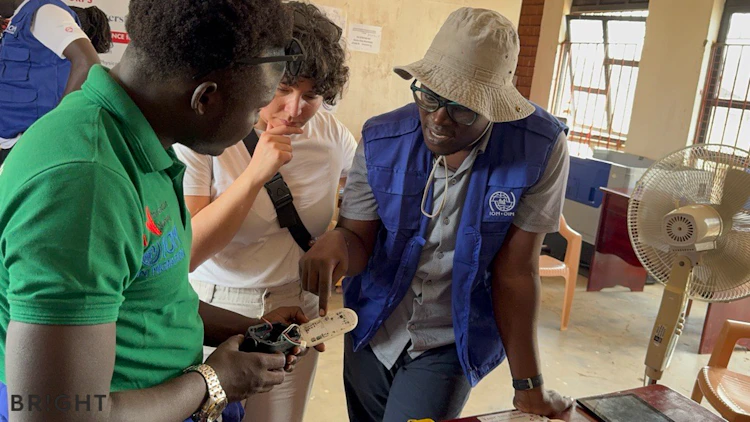
In 2020, IOM initiated the E-Waste Management Project in Bidibidi, Uganda, funded by Innovation Norway’s Humanitarian Innovation Program. Launched in 2022, this multi-stakeholder effort currently includes BRIGHT, Mercy Corps, AceleAfrica, along with research partners Open Energy Labs, Strathmore University, and the WEEE Center. The project established:
- E-waste collection: Community mobilisers, led by Mercy Corps, collect broken solar lamps and raise e-waste awareness.
- Repair centre: Technicians repair solar lamps using BRIGHT’s training and spare parts.
- Battery laboratory (Bat Lab): Technicians, trained by AceleAfrica, repurpose battery cells into battery packs, extending their utility.
BRIGHT began training in March 2022, led by Head of R&D and Manufacturing, Line Iren Andersen, and Head of Sales, Madeleine Chapman Kjellevand. Initially, eight technicians – ranging from novices to those with minimal repair experience – learnt to repair BRIGHT’s solar lamps, enhancing their technical and digital skills.
Impact of the project
Since 2022, the technicians trained through the Repair Program have repaired 6,361 solar lamps and 341 solar panels, significantly reducing e-waste.
Lorena explains that the overall value of the project cannot just be quantified in numbers alone. “In feedback sessions technicians, have reported remarkable improvements in their livelihoods and personal lives because of their repair work.”

She points out that some of the program’s impact includes the development of soft skills like digital literacy, and communication skills like public speaking. Lorena adds that one of the technicians reported how the E-waste Management project has changed her perception of what women can do in a technical field.
Repaired lamps enable night-time business operations, while technicians advocate for proper e-waste disposal to protect soil and water, with reports that attitudes in the community towards e-waste are shifting. “This project is for the community, by the community,” says Lorena.
Improvement of livelihoods
Technicians have improved their financial stability, with some investing in education, homes. One elderly participant even bought a moped to help him get around the settlement.
During the transition-to-scale phase, the project focused on refining a viable business model with the support of the research partners. In 2024, project participants formed the 30-member Bidibidi Electronic Multipurpose Cooperative Society (BEMCOS), which now charges for repairs, ensuring financial sustainability of the initiative. The cooperative, which comprises refugees and host community members, will eventually manage and oversee the project’s continuation.
In July 2025, BEMCOS was one of the winners at the Uganda Business Idea Contest organised by Deloitte, the Government of Uganda, and JICA, in collaboration with UNHCR Japan and Welcome Japan. The contest promotes self-reliance and peaceful coexistence between refugees and host communities through innovative business solutions. Along with a $3,000 prize, and further technical support, BEMCOS will represent the initiative at Expo 2025 in Osaka, Japan.
Knowledge transfer and upskilling
While initially limited in scope to repairing and refurbishing BRIGHT solar lamps, the training provided through the Repair Program has built confidence in the technicians’ technical ability, enabling them to attempt repairs of other electronic devices.
The Repair Program compliments the deep-rooted repair culture and a strong demand for these technical services that BRIGHT’s team observed in Bidibidi. “During our visits to Bidibidi we have noticed on numerous occasions a strong willingness among technicians to repair lamps, with some even going beyond the planned scope of repairs covered by the E-waste Management project,” points out Lorena.
During a feedback session held in 2024, there was consensus among BEMCOS members that they wanted to expand their technical capabilities and skills to enable them to repair a broader range of electronic goods, they also expressed interest in acquiring advanced skills like electrical installation.
The Repair Program also helped the participants improve their digital skills as participants initially use digital tablets to access the repair training platform, and different digital platforms to log reports on the repair work they are doing, as well as for end-user surveys. Lorena recalls one participant who expressed a sense of pride in being able to use a digital tablet after initially struggling to use it.
Informed improvements in solar lamp product design
E-waste management projects of this nature are a key feedback loop for product design and improvement. The Repair Program has yielded actionable insights for product development, helping identify weak points in existing products, and informing the design of new, more durable and repairable ones.
Field data collected during the project revealed weak points in the power button and flip lids of an earlier design of the popular SunBell lamp. These observations promptly triggered design updates to the SunBell to address these issues.
Insights from the Repair Program have also shaped and influenced the design of the Sol product range. Sol is one of BRIGHT’s newest solar lamps designed with repairability and durability in mind. With fewer components than the SunBell, integrated buttons, and reinforced lids to reduce failure points, Sol is more durable and easier to repair and recycle, embodying BRIGHT’s commitment to a circular economy.
This symbiotic relationship between field repairs and product development ensures BRIGHT’s lamps are built to last, reducing e-waste and environmental impact.
Changed attitudes about e-waste
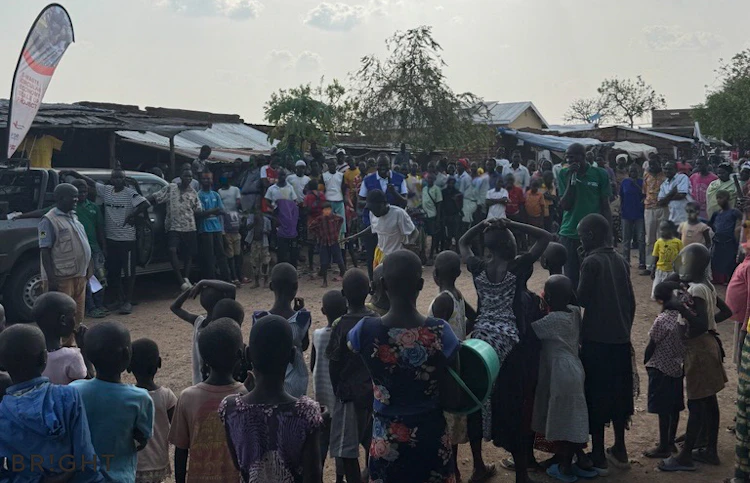
The Repair Program, and the wider E-waste Management project have raised awareness about e-waste’s environmental and health risks. Technicians now educate other community members on proper disposal and handling. “Technicians want to extend this knowledge across the settlement,” notes Lorena.
“We believe that this initiative could be replicated in other displacement settlements around the world. The key for success is to make the community a central part, and to understand the context dynamics." Lorena Muñoz Carmona, Head of Humanitarian Partnerships, BRIGHT
Importance of centering community voices
Community input has been central to the project’s success. As members of the community, project participants in initiatives like this are aware of the common causes for repairs and end-user behaviours that lie at the root of some technical issues. BEMCOS representatives actively participate in project discussions as key stakeholders, ensuring community-driven decision-making.
For example, during a visit to Bidibidi, BRIGHT’s team learnt that some technicians prioritised ease of future repairs, opting to use electric tape instead of screws or glue. This would result in sub-optimal repairs which compromised the durability of solar lamps, leading to more e-waste. Consequently, to deal with this, BRIGHT raised awareness among technicians on the importance of durable repairs to extend lifespans and reduce e-waste.
Insights from project participants regarding end-user behaviours, such as cable cutting, have highlighted the need for specific spare parts and tools. For instance, in 2022, a request was made to BRIGHT to include additional solar panels in the next shipment of spare parts. However, during a follow-up field visit in January 2023, BRIGHT’s team discovered that the solar panels labelled as broken or non-functional were in working condition. The real issue stemmed from cables that had been deliberately cut.
Technicians and community mobilisers involved in the E-waste Management project explained that some end-users were cutting and selling the copper wires from the solar panel cables in the informal market, while others were modifying the cables to charge other devices directly. In response, BRIGHT began supplying barrel jack plugs, which help prevent misuse and enhance durability. This solution proved not only more cost-effective but also more sustainable, given that solar panels have a significantly higher carbon footprint compared to cables.
Scaling for a brighter future
The E-waste Management project is now entering its full scalability phase. When the project launched in 2022, collections and repairs were initially done in Zone 4 of the settlement. During the transition-to-scale phase the project expanded to all five zones of the settlement, with two new permanent workshops and two tuk-tuks (motorcycle-trucks) which will enable BEMCOS to serve the entirety of Bidibidi.
For the full scalability there are plans to expand to the neighbouring Rhino and Imvepi settlements, which would likely make this the largest e-waste management initiative in displacement settings in the world. External experts will be brought in to provide advanced electronics training, enabling technicians to learn how to repair a wider range of electronic devices. BRIGHT will continue supplying spare parts and technical support while quantifying emissions reductions from repairs to highlight environmental impact.
In Bidibidi, every repaired lamp is a testament to how refugee-led resilience, innovation, and a displaced community empowered to shape its own future can turn e-waste into opportunity. This project’s model — blending partnership, sustainability, skill-building, and community ownership — offers a blueprint for impact.
“We believe that this initiative could be replicated in other displacement settlements around the world. We have collaborated with other actors to facilitate repair and e-waste management, for example in Cox’s Bazar (Bangladesh). The key for success is to make the community a central part, and to understand the context dynamics,” explains Lorena.
Interested in collaborating on our Repair Program?
BRIGHT’s Repair Program demonstrates how sustainability, skill-building, partnership and community ownership can address e-waste in humanitarian settings. If your organisation shares our ambition to cut e-waste and empower displaced communities, contact our partnerships team at partnerships@bright-products.com or learn more about our partnership opportunities.




